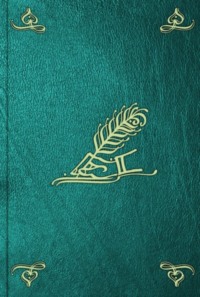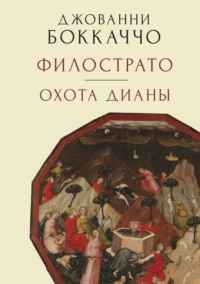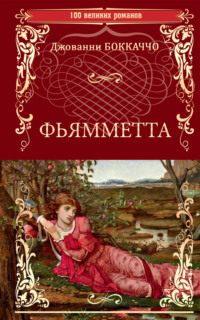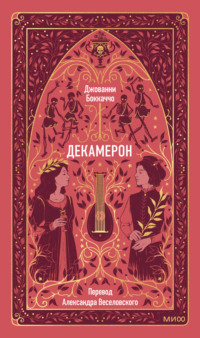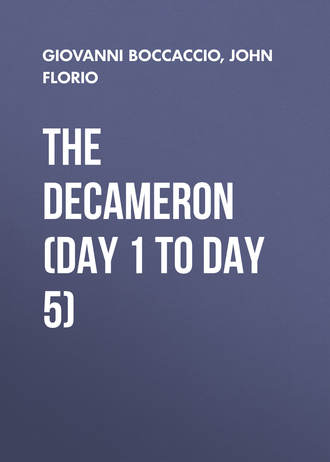 полная версия
полная версияThe Decameron (Day 1 to Day 5)
After some few dayes of her reposing there, the Soldan was desirous to understand, how she could possibly live so long, in any Kingdome or Province whatsoever, and yet no knowledge to bee taken of her? The Lady, who perfectly retained by heart, and had all her lessons at her fingers ends, by the warie instructions which Antigonus had given her, answered her father in this manner. Sir, about the twentith day after my departure from you, a verie terrible and dreadfull tempest over-tooke us, so that in dead time of the night, our ship being split in sunder upon the sands, neere to a place called Varna; what became of all the men that were aboord, I neither know, or ever heard of. Onely I remember, then when death appeared, and I being recovered from death to life, certaine pezants of the countrey, comming to get what they could finde in the ship so wrackt, I was first (with two of my women) brought and set safely on the shore.
No sooner were we there, but certaine rude shagge-haird villaines set upon us, carrying away from me both my women, then haling me along by the haire of my head, neither teares or intercessions could draw any pitty from them. As thus they dragd me into a spacious Woodd, foure horsemen on a sodaine came riding by, who seeing how dishonourably the villaines used me, rescued me from them, and forced them to flight. But the foure horsemen, seeming (in my judgement) to bee persons of power and authority, letting them go, came to mee, urging sundry questions to me, which neither I understood, or they mine answers. After many deliberations held among themselves, setting me upon one of their horses, they brought me to a Monastery of religious women, according to the custome of their law: and there, whatsoever they did or sayde, I know not, but I was most benignely welcommed thither, and honoured of them extraordinarily, where (with them in devotion) I dedicated my selfe to the Goddesse of chastity, who is highly reverenced and regarded among the women of that Countrey, and to her religious service, they are wholly addicted.
After I had continued some time among them, and learned a little of their language; they asked me, of whence, and what I was. Reason gave me so much understanding, to be fearfull of telling them the trueth, for feare of expulsion from among them, as an enemy to their Law and Religion: wherefore I answered (according as necessity urged) that I was daughter to a Gentleman of Cyprus, who sent me to bee married in Candie; but our fortunes (meaning such as had the charge of mee) fell out quite contrary to our expectation, by losses, Shipwracke, and other mischances; adding many matters more beside, onely in regard of feare, & yeelding obediently to observe their customes.
At length, she that was in cheefest preheminence among these Women (whom they termed by the name of their Lady Abbesse) demaunded of me, whither I was willing to abide in that condition of life, or to returne home againe into Cyprus. I answerd, that I desired nothing more. But she, being very carefull of mine honour, would never repose confidence in any that came for Cyprus; till two honest Gentlemen of France, who hapned thither about two moneths since, accompanied with their wives, one of them being a neere kinswoman to the Lady Abbesse. And she well knowing, that they travelled in pilgrimage to Jerusalem, to visit the holy Sepulcher, where (as they beleeve) that he whom they held for their God was buried, after the Jewes had put him to death: recommended me to their loving trust, with especial charge, for delivering me to my Father in Cyprus. What honourable love and respect I found in the company of those Gentlemen and their wives, during our voyage backe to Cyprus: the history would be over-tedious in reporting, neither is it much material to our purpose, because your demand is to another end.
Sayling on prosperously in our Ship, it was not long, before wee arrived at Baffa, where being landed, and not knowing any person, neither what I should say to the Gentlemen, who onely were carefull for delivering me to my Father, according as they were charged by the reverend Abbesse: it was the will of heaven doubtlesse (in pitty and compassion of my passed disasters) that I was no sooner come on shore at Baffa: but I should there haply meete with Antigonus, whome I called unto in our countrey Language, because I would not be understood by the Gentlemen nor their wives, requesting him to acknowledge me as his Daughter. Quickly he apprehended mine intention, accomplishing what I requested, and (according to his poore power) most bounteously feasted the Gentlemen and their wives, conducting me to the K. of Cyprus, who received me royally, and sent me home to you with so much honour, as I am no way able to relate. What else remaineth to be said, Antigonus who hath oft heard the whole story of my fortunes, at better leisure will report.
Antigonus then turning to the Soldan, said: My Lord, as shee hath often told me, and by relation both of the Gentlemen and their wives, she hath delivered nothing but trueth. Onely shee hath forgotten somewhat worth the speaking, as thinking it not fit for her to utter, because (indeede) it is not so convenient for her. Namely, how much the Gentlemen and their wives (with whom she came) commended the rare honesty and integrity of life, as also the unspotted vertue, wherein she lived, among those chaste Religious women, as they constantly (both with teares and solemne protestations) avouched to me, when kindly they resigned their charge to mee. Of all which matters, and many more beside, if I should make discourse to your Excellencie; this whole day, the night ensuing, and the next dayes full extendure, are not sufficient to acquaint you withall. Let it suffice then, that I have said so much, as (both by the reports, and mine owne understanding) may give you faithfull assurance, to make your Royall vaunt; of having the fayrest, most vertuous, and honest Lady to your Daughter, of any King or Prince whatsoever.
The Soldane was joyfull beyond all measure, welcomming both him and the rest in most stately manner, oftentimes entreating the Gods very heartily, that he might live to requite them with equall recompence, who had so graciously honoured his daughter: but (above all the rest) the King of Cyprus, who sent her home so majestically. And having bestowne great gifts on Antigonus, within a few dayes after, hee gave him leave to returne to Cyprus: with thankfull favours to the King as well by Letters, as also by Ambassadours espresly sent, both from himselfe and his daughter.
When as this businesse was fully finished, the Soldane, desiring to accomplish what formerly was intended and begun, namely, that shee might be wife to the King of Cholcos: he gave him intelligence of all that had happened, writing moreover to him, that (if he were so pleased) hee would yet send her in Royall manner to him. The King of Cholcos was exceeding joyfull of these glad tydings, and dispatching a worthy trayne to fetch her, she was convayed thither very pompously, and she who had beene embraced by so many, was received by him as an honest virgine, living long time after with him in much joy and felicity. And therefore, it hath beene said as a common Proverbe: The mouth well kist comes not short of good fortune, but is still renewed like the Moone.
The Count D'Angiers being falsly accused, was banished out of France, & left his two children in England in divers places. Returning afterward (unknowne) thorow Scotland, hee found them advanced unto great dignity. Then, repayring in the habite of a Servitour, into the King of France his Armie, and his innocencie made publiquely knowne; hee was reseated in his former honourable degreeThe eight Novell
Whereby all men may plainely understand, that loyalty faithfully kept to the Prince (what perils so ever doe ensue) doth yet neverthelesse renowne a man, and bring him to farre greater honourThe Ladies sighed very often, hearing the variety of wofull miseries happening to Alathiella: but who knoweth, what occasion moved them to those sighes? Perhaps there were some among them, who rather sighed they could not be so often married as she was, rather then for any other compassion they had of her disasters. But leaving that to their owne construction, they smiled merrily at the last speeches of Pamphilus, and the Queene perceiving the Novell to be ended: shee fixed her eye upon Madame Eliza, as signifying thereby, that she was next to succeede in order, which shee joyfully embracing, spake as followeth. The field is very large and spacious, wherein all this day we have walked, and there is not any one here, so wearied with running the former races, but nimbly would adventure on as many more, so copious are the alterations of Fortune, in sad repetition of her wonderfull changes; and among the infinity of her various courses, I must make addition of another, which I trust will no way discontent you.
When the Romaine Empire was translated from the French to the Germains, mighty dissentions grew between both the nations, insomuch that it drew a dismall and a lingring warre. In which respect, as well for the safety of his owne Kingdome, as to annoy and disturbe his enemies; the King of France and one of his sonnes, having congregated the forces of their owne dominions, as also of their friends and confederates, they resolved manfully to encounter their enemies. But before they would adventure on any rash proceeding; they held it as the chiefest part of pollicie and Royall providence, not to leave the State without a chiefe or Governour. And having had good experience of Gualtier, Counte D'Angiers, to be a wise, worthy, and most trusty Lord, singularly expert in militarie discipline, and faithfull in all affaires of the Kingdome (yet fitter for ease and pleasure, then laborious toyle and travaile:) hee was elected Lieutenant Governour in their sted, over the whole Kingdome of France, and then they went on in their enterprize.
Now began the Counte to execute the office committed to his trust, by orderly proceeding, and with great discretion, yet not entring into any businesse, without consent of the Queene and her faire daughter in law: who although they were left under his care and custodie, yet (notwithstanding) he honoured them as his superiours, and as the dignity of their quality required. Heere you are to observe, concerning Counte Gualtier himselfe, that he was a most compleat person, aged little above forty yeares; as affable and singularly conditioned, as any Noble man possibly could be, nor did those times afford a Gentleman, that equalled him in all respects. It fortuned, that the King and his sonne being busie in the afore-named warre, the wife and Lady of Counte Gualtier died in the meane while, leaving him onely a sonne and a daughter, very young and of tender yeares, which made his owne home the lesse welcome to him, having lost his deare Love and second selfe.
Hereupon, hee resorted to the Court of the said Ladies the more frequently, often conferring with them, about the waighty affaires of the Kingdome: in which time of so serious interparlance, the Kings Sonnes wife, threw many affectionate regards upon him, convaying such conspiring passions to her heart (in regard of his person and vertues) that her love exceeded all capacity of governement. Her desires out-stepping all compasse of modesty, or the dignity of her Princely condition; throwes off all regard of civill and sober thoughts, and guides her into a Labyrinth of wanton imaginations. For, she regards not now the eminencie of his high authority, his gravity of yeares, and those parts that are the true conducts to honour: but lookes upon her owne loose and lascivious appetite, her young, gallant, and over-ready yeelding nature, comparing them with his want of a wife, and likely hope (thereby) of her sooner prevailing; supposing, that nothing could be her hinderance, but onely bashfull shame-facednesse, which she rather chose utterly to forsake and set aside, then to faile of her hote enflamed affection, and therefore, shee would needes be the discoverer of her owne disgrace.
Upon a day, being alone by her selfe, and the time seeming suteable to her intention: shee sent for the Counte, under colour of some other important conference with him. The Counte D'Angiers, whose thoughts were quite contrary to hers: immediately went to her, where they both sitting downe together on a beds side in her Chamber, according as formerly shee had plotted her purpose; twice hee demaunded of her, upon what occasion she had thus sent for him. She sitting a long while silent, as if she had no answere to make him: pressed by the violence of her amorous passions, a vermillion tincture leaping up into her face, yet shame enforcing teares from her eyes, with words broken and halfe confused, at last she began to deliver her minde in this manner.
Honourable Lord, and my dearely respected friend, being so wise a man as you are, it is no difficult matter for you to know, what a fraile condition is imposed both on men and women; yet (for divers occasions) much more upon the one, then the other. Wherefore desertfully, in the censure of a just and upright Judge, a fault of divers conditions (in respect of the person) ought not to be censured with one and the same punishment. Beside, who will not say, that a man or woman of poore and meane estate, having no other helpe for maintainance, but labourious travaile of their bodies should worthily receive more sharpe reprehension, in yeelding to amorous desires, or such passions as are incited by love; then a wealthy Lady whose living relieth not on her paines or cares, neither wanteth any thing that she can wish to have: I dare presume, that you your selfe will allow this to be equall and just. In which respect, I am of the minde, that the fore-named allegations, ought to serve as a sufficient excuse, yea, and to the advantage of her who is so possessed, if the passions of love should over-reach her: alwayes provided, that shee can pleade (in her owne defence) the choise of a wise and vertuous friend, answerable to her owne condition and quality, and no way to be taxed with a servile or vile election.
These two especiall observations, allowable in my judgement, and living now in me, seazing on my youthfull blood and yeares: have found no mean inducement to love, in regard of my husbands far distance from me, medling in the rude uncivill actions of warre, when he should rather be at home in more sweet imployment. You see Sir, that these Orators advance themselves here in your presence, to acquaint you with the extremity of my over-commanding agony: and if the same power hath dominion in you, which your discretion (questionlesse) cannot be voide of; then let me entreate such advise from you, as may rather helpe, then hinder my hopes. Beleeve it then for trueth Sir, that the long absence of my husband from me, the solitary condition wherein I am left, ill agreeing with the hot blood running in my veines, & the temper of my earnest desires: have so prevailed against my strongest resistances, that not onely so weake a woman as I am, but any man of much more potent might (living in ease and idlenesse as I doe) cannot withstand such continuall assaults, having no other helpe then flesh and blood.
Nor am I so ignorant, but publique knowledge of such an error in me, would be reputed a shrewd taxation of honesty: whereas (on the other side) secret carriage, and heedfull managing such amorous affaires, may passe for currant without any reproach. And let me tell you Noble Counte, that I repute Love highly favourable to mee, by guiding my judgement with such moderation, to make election of a wise, worthy, and honourable friend, fit to enjoy the grace of a farre greater Lady then I am, and the first letter of his name, is the Count D'Angiers. For if error have not misled mine eye, as in Love no Lady can be easily deceived: for person, perfections, and all parts most to be commended in a man, the whole Realme of France containeth not your equall. Observe beside, how forward Fortune sheweth her selfe to us both in this case, you to be destitute of a wife, as I am of an husband; for I count him as dead to me, when he denies me the duties belonging to a wife. Wherefore, in regard of the unfaigned affection I beare you, and compassion, which you ought to have of Royall Princesse, even almost sicke to death for your sake: I earnestly entreate you, not to denie me your loving society, but pittying my youth and fiery afflictions (never to be quenched but by your kindnesse) I may enjoy my hearts desire.
As shee uttered these words, the teares streamed aboundantly downe her faire cheekes, preventing her of any further speech: so that dejecting her head into her bosome, overcome with the predominance of her passions; shee fell upon the Countes knee, whereas else shee had falne upon the ground. When hee, like a loyall and most honourable man, sharply reprehended her fonde and idle love, and when shee would have embraced him about the necke; hee repulsed her roughly from him, protesting upon his honourable reputation, that rather then hee would so wrong his Lord and Maister, he would endure a thousand deathes.
The Lady seeing her desire disappointed, and her fond expectation utterly frustrated: grewe instantly forgetfull of her intemperate love, and falling into extremity of rage, converted her former gentle speeches, into this harsh and ruder language. Villaine (quoth shee) shall the longing comforts of my life, be abridged by thy base and scornefull deniall? Shall my destruction bee wrought by thy currish unkindnesse, and all my hoped joyes be defeated in a moment? Know slave, that I did not so earnestly desire thy sweet embracements before, but now as deadly I hate and despise them, which either thy death or banishment shall dearely pay for. No sooner had shee thus spoken, but tearing her haire, and renting her garments in pieces, shee ranne about like a distracted woman, crying out aloude: Helpe, helpe, the Count D'Angiers will forcibly dishonour mee, the lustfull Count will violence mine honour.
D'Angiers seeing this, and fearing more the malice of the over-credulous Court, then either his owne conscience, or any dishonourable act by him committed, beleeving likewise, that her slanderous accusation would bee credited, above his true and spotlesse innocency: closely he conveyed himselfe out of the Court, making what hast hee could, home to his owne house, which being too weake for warranting his safety upon such pursuite as would be used against him, without any further advice or counsell, he seated his two children on horsebacke, himselfe also being but meanly mounted, thus away thence hee went to Calice.
Upon the clamour and noise of the Lady, the Courtiers quickly flocked thither; and, as lies soone winne beleefe in hasty opinions, upon any silly or shallow surmise: so did her accusation passe for currant, and the Counts advancement being envied by many, made his honest carriage (in this case) the more suspected. In hast and madding fury, they ran to the Counts houses, to arrest his person, and carry him to prison: but when they could not finde him, they raced his goodly buildings downe to the ground, and used all shamefull violence to them. Now, as il newes sildome wants a speedy Messenger; so, in lesse space then you will imagine, the King and Dolphin heard thereof in the Camp, and were therewith so highly offended, that the Count had a sodaine and severe condemnation, all his progeny being sentenced with perpetuall exile, and promises of great and bountifull rewards, to such as could bring his body alive or dead.
Thus the innocent Count, by his over-hasty and sodaine flight, made himselfe guilty of this foule imputation: and arriving at Callice with his children, their poore and homely habites, hid them from being knowne, and thence they crossed over into England, staying no where untill hee came to London. Before he would enter into the City, he gave divers good advertisements to his children, but especially two precepts above all the rest. First, with patient soules to support the poore condition, whereto Fortune (without any offence in him or them) had thus dejected them. Next, that they should have most heedfull care, at no time to disclose from whence they came, or whose children they were, because it extended to the perill of their lives. His Sonne, being named Lewes, and now about nine yeares old, his daughter called Violenta, and aged seaven yeares, did both observe their fathers direction, as afterward it did sufficiently appeare. And because they might live in the safer securitie, hee thought it for the best to change their names, calling his sonne Perotto, and his daughter Gianetta, for thus they might best escape unknowne.
Being entred into the Citty, and in the poore estate of beggers, they craved every bodies mercy and almes. It came to passe, that standing one morning at the Cathedrall Church-doore, a great Lady of England, being then wife to the Lord high Marshall, comming forth of the Church, espied the Count and his children there begging. Of him she demanded what Countrey-man he was? and whether those children were his owne, or no? The Count replyed, that he was borne in Picardy, and for an unhappy fact committed by his eldest sonne (a stripling of more hopefull expectation, then proved) hee was enforced, with those his two other children to forsake his country. The Lady being by nature very pittiful, looking advisedly on the yong Girle, beganne to grow in good liking of her; because (indeede) she was amiable, gentle, and beautifull, whereupon shee saide. Honest man, thy daughter hath a pleasing countenance, and (perhaps) her inward disposition may proove answerable to hir outward goods parts: if therefore thou canst bee content to leave her with me, I will give her entertainment, and upon her dutifull carriage and behaviour, if she live to such yeares as may require it, I will have her honestly bestowne in marriage. This motion was verie pleasing to the Count, who readily declared his willing consent thereto, and with the teares trickling downe his cheekes, in thankfull manner he delivered his prettie daughter to the Lady.
Shee being thus happily bestowne, hee minded to tarry no longer in London; but, in his wonted begging manner, travailing thorough the Country with his sonne Perotto, at length hee came into Wales: but not without much weary paine and travell, being never used before, to journey so far on foote. There dwelt another Lord, in office of Marshalship to the King of England, whose power extended over those partes; a man of very great authority, keeping a most noble and bountifull house, which they termed the President of Wales his Court; whereto the Count and his son oftentimes resorted, as finding there good releefe and comfort. On a day, one of the Presidents sons, accompanied with divers other Gentlemens children, were performing certaine youthfull sports & pastimes, as running, leaping, and such like, wherein Perotto presumed to make one among them, excelling all the rest in such commendable manner, as none of them came any thing nere him. Divers times the President had taken notice thereof, and was so well pleased with the Lads behaviour, that he enquired, of whence he was? Answer was made, that hee was a poore mans son, that every day came for an almes to his gate.
The President being desirous to make the boy his, the Count (whose dayly prayers were to the same purpose) frankly gave his son to the Nobleman: albeit naturall and fatherly affection, urged some unwillingnesse to part so with him; yet necessity and discretion, found it to bee for the benefit of them both. Being thus eased of care for his son and daughter, and they (though in different places) yet under good and woorthie government: the Count would continue no longer in England: but, as best he could procure the meanes, passed over into Ireland, and being arrived at a place called Stanford, became servant to an Earle of that Country, a Gentleman professing Armes, on whom he attended as a serving man, & lived a long while in that estate very painfully.


